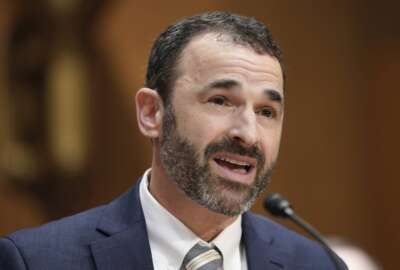Congress labors to keep the budget deal alive
The continuing resolution funding the government runs out Friday at 11:59 p.m. So far the spending limits Republicans and Democrats agreed to, a week or so ago,...
The continuing resolution funding the government runs out Friday at 11:59 p.m. So far the spending limits Republicans and Democrats agreed to, a week or so ago, have not translated into bills for full 2024 appropriations. That means neither a long-term continuing resolution nor a shutdown is off the table. For the latest, the Federal Drive with Tom Temin spoke with WTOP Capitol Hill correspondent Mitchell Miller.
Interview Transcript:
Mitchell Miller Right now things are looking better, but things were not looking good heading into the weekend. But during the weekend things changed. House speaker Mike Johnson and Senate Majority Leader Chuck Schumer announcing plans for this new twostep short term spending agreement. It would go beyond this Friday’s deadline and a February 2nd deadline and extend spending through March 1st and March 8th. The state of the Union address is March 7th. First deadline would be for a partial government shutdown, as the current one is now with spending for four appropriations bills. The Senate today plans to take a procedural vote to set things in motion. This continuing resolution is expected to get through the Senate, and then there will be a House vote, which, as usual, will include some drama. Conservatives have already made it clear they don’t want another short-term spending bill, and they’re going to vote against it. Speaker Johnson is again going to need the help of Democrats to get this legislation passed, as he did the last time. Also, to avoid a partial government shutdown, two thirds of the House will need to approve this, but I think it will get done since lawmakers have little choice.
Tom Temin Well, if they agreed on a top line number, why can’t they get to a spending bill?
Mitchell Miller I think for a couple of reasons. One, that House speaker Mike Johnson is new in this position and still trying to get his footing. And secondly, the outsized influence of the House Freedom Caucus. Since the Republican majority is so small, Johnson has, like former Speaker Kevin McCarthy before him, tried to listen to all members of this unwieldy GOP conference. So last week he met with various Republican groups, including hard line conservatives who he’s been close to before becoming speaker. They essentially said, you haven’t been tough enough with the Senate on issues like the southern border and pushing for deeper spending cuts. And after their meeting last week, some thought they had caused the speaker to open up the possibility of reopening negotiations on that top line budget number. But he later indicated he was just keeping an open mind and also met with more moderate members of the conference. Most Republicans fully understand that there’s no way to quickly pass 12 appropriations bills, and I believe the thinking here is, no matter what Johnson does, the House Freedom Caucus is going to be unhappy with him. So he’s going to, again, rely on Democrats, as I mentioned, to avoid a shutdown, while at the same time looking over his shoulder, hoping no conservative makes a motion to vacate the chair, as they did with Kevin McCarthy, who went from being speaker of the House to no longer being in Congress.
Tom Temin You know, and if they remove Johnson and then he leaves the Congress, I mean, the Republican majority is slipping away like sands through an hourglass here.
Mitchell Miller It really is. I mean, right now we’re down to a two-vote majority, in part because the former House speaker, who would have thought that actually left Congress? And then you had George Santos being kicked out of Congress. So, you start losing more, and there are retirements on the way as well. They literally are down to, as you say, the sands in the hourglass, 1 or 2 or even no votes if things continue to move the way they are.
Tom Temin And you spoke to some of the lawmakers in the Senate and the House on the Democratic side, and they’re kind of scratching their heads, sounds like.
Mitchell Miller Right. Well, for one thing, related to the deal on the top line, former House Majority Leader Steny Hoyer, Maryland congressman, he’s been through a lot of these. He said, when you reach a deal, you want to have a deal. You don’t want to have to keep renegotiating deal after deal after deal. So, he’s concerned about it. I talked to Senator Mark Warner and Senator Tim Kaine of Virginia. Both are once again very concerned about the impact this is going to have, because it raises all the uncertainty for federal workers, not to mention contractors with the federal government. They said that they’re feeling like it’s a bad movie all over again.
Tom Temin We’re speaking with Mitchell Miller, WTOP Capitol Hill correspondent, and tell us more about what has been happening with the IRS. They got not appropriated money from the regular spending, but they got this $80 billion, ostensibly over ten years. But that 60 billion is shrinking, even though it didn’t come from appropriation, normal appropriations that came from the I think it was the infrastructure bill.
Mitchell Miller Right. That was also part of this top line agreement where Democrats wanted to basically throw a bone to the House speaker and said, okay, you can cut away $20 billion to the IRS, but they still have $60 billion that they’re now pouring into improving infrastructure within the agency as well as IT. And one positive note that came out for the IRS was the report from the National Taxpayer Advocate in the letter to Congress. Last week, basically saying that things while they are not quite exactly back to normal. Remember we talked a lot about those backlogs with the IRS and tax forms and people not being able to get through on the phone and get assistance. A lot of improvement in that area. Not to say that it’s all perfect, obviously, but that report indicated a lot of optimism that this is really starting to turn around. And the supporters of the funding, many of them Democrats, say that this is really going to help, ultimately over the long haul, allowing taxpayers to get the assistance they need. Of course, on the other side, a lot of Republicans say this is terrible because it’s going to come down harder on people that don’t make a ton of money. And there’s been a lot of hyperbole, frankly, about what tax agents are going to do. But nonetheless, I think that big aircraft carrier that is the IRS agency is slightly starting to turn around now.
Tom Temin All right. And, you know, we had the incident of the secretary of Defense, Lloyd Austin, being a little not quite a wall, but disappeared for a few days. Now we understand, you know, that from published reports that he’s directing the bombing of the Houthis from his hospital bed. What a great country, huh? So, any reaction on Hill or any action likely to be taken because even some Democrats were saying, hmm, this doesn’t look so good, right?
Mitchell Miller That was one of the things that Senator Tim Kaine said he had some issues with. He’s a member of the Senate Armed Services Committee. He doesn’t think that necessarily, as some people said, that maybe the defense secretary should resign. But clearly, I think there is a push among lawmakers to clarify what happens when you have, admittedly, maybe a rare incident like this. I mean, it’s certainly something that got a lot of attention, especially when we learned that he has a form of cancer. But a lot of people also don’t want to come down too hard on him. Uh, there was a lot of things, as you know, that happened at that time. He had another person who was very high ranking who was out sick. But really, when you’re talking about matters of war, as you just mentioned, you have to have a clear line of where things are going if somebody is out. And that’s where I think the lawmakers are really going to make a push.
Tom Temin And I wonder if underlying that concern is the is the slight drone of the fact that his condition might be more serious than even we know now, because a prostatectomy that’s pretty radical because most men that have a prostate problem, even cancer, there are much less radical ways of dealing with it. Right.
Mitchell Miller And so I think that he was hopeful, as many people would be in a health situation like that, that it could be taken care of fairly quickly. I have heard medical experts say that clearly, that there were complications. And I think that also contributed to the uncertainty that maybe he was thinking, okay, I can get this done fairly quickly and move on. And as we know with health, you just don’t know what’s going to happen. And I think that uncertainty is what makes a lot of people nervous on Capitol Hill.
Tom Temin All right. So, what’s going to happen this week then there’s more Hunter Biden stuff maybe in the budget.
Mitchell Miller Well there’s not going to be a lot of surprises. Maybe not on the level of Hunter Biden. That was quite an incident last week. But I think we’re going to just get into that crunch time again over the next few days. You know, we’re coming off a holiday. And as we talked about this at the end of last year, there wasn’t going to be enough time to get to all of these bills. And I think they have no choice really, but to go for a continuing resolution. I think the real question will be how long is it going to be right?
Tom Temin And if it goes for the rest of the fiscal year, then sequestration occurs. So that might please the more conservative end of the Republicans because it brings cuts automatically.
Mitchell Miller Right. And that was the whole idea behind the debt ceiling agreement. On the other hand, a lot of people say they don’t want a long-term agreement talking about the military, because if you lock in those figures, they say that’s effectively a cut for the Pentagon.
Copyright © 2025 Federal News Network. All rights reserved. This website is not intended for users located within the European Economic Area.
Tom Temin is host of the Federal Drive and has been providing insight on federal technology and management issues for more than 30 years.
Follow @tteminWFED






